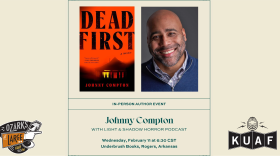Fayetteville-based writing collective Bee Balm is hosting a Poetry Week at locations across Northwest Arkansas today through Oct. 18. One of the featured poets is Houston-based Randall James Tyrone, whose novel in verse, "City of Dis," was recently published by Texas A&M University Press. Tyrone spoke with Ozarks at Large’s Daniel Caruth about the debut collection, his writing process, and how an economic recession early in his career pushed him to pursue poetry.
Tyrone: Funny enough, I was a NASA intern for three years. But as any millennial has the same story, our lives were kind of marked by recessions, which during that interim period led to a downsizing of government institutions, particularly ones that people often determine are “frivolous” because they're just unaware of what these programs do.
So seeing that a NASA engineer can be fired after 40 years of work kind of means you're pretty much free to do whatever you want if the outcome can always end up the same. I just felt that if you're going to do something, why not do something kind of crazy?
Carruth: Do you feel like you have more—by doing this as a novel in verse, do you feel like you have more leeway to play with form in that way? I mean, is that freeing for you, I guess, as a writer?
Tyrone: I do come from the school of thought that the form should follow function. And I do think that this is probably the best form that I, like me, Randall, could think of effectively writing this book. You're always negotiating between your skill and capacity. Like, I can maybe think of a better way to have done this, but could I physically have done it? Is a question you always kind of run into.
But the freedom, particularly in poetic forms, is I am training you, as the poems move on, how to read this book. They're both concise enough—you know, like a long poem in poetry is like four to five pages—but a long chapter is 30. So it's both small enough for them to easily ingest, but it's still giving the same rigid structure for them to understand how things are progressing.
Caruth: You'll be coming to Northwest Arkansas to be part of the Bee Balm Poetry Festival. And I know that you and Bleah Patterson are holding a couple of craft talks where you're helping people go through that editing and publishing and workshopping process. Can you talk a little bit about how you think about the craft of poetry now and what you guys hope to share with people who come to those workshops?
Tyrone: I first want to say that I'm very excited to be coming to Arkansas for this festival. I've never been to Arkansas. This will actually be the first reading I do—both book launch—so it'll always be a special moment for me.
In the craft talks, I'm very grateful to know Bleah, our craft talks are following one another. My portion will also focus on how to stop the endless editing process. Anyone who writes knows that you, as post-writer, are now in the editing phase to make things clear. But the problem is you can essentially do that forever. There's always something you feel you could tweak.
I think the easiest way to overcome that is to identify your goals. And by goals, I mean what should this particular piece of writing do? How do I want it to come across? What is my message? Truthfully, you could have one poem in eight different versions and they all be good, but you ultimately need to choose which is the one that works for you.
And when I say “you” as author, it also changes. As time progresses, we become different people, which is how you often hear writers say, “Oh, I really don't like my earlier work.” They aren't the same person who wrote that earlier work. And although they may think it's a skill issue, really your taste has changed. Your philosophies behind the writing have changed. You will change as time progresses, which means you will want to make changes as time progresses, meaning you never stop working on the same thing.
I guess you could call it the “live and let go” craft talk—but more so identifying when something is done to you.
Caruth: Speaking of those writer workshops and collectives and festivals like this—most of us think of writing as a very solitary, singular thing. Why is it important to have spaces and opportunities like this for people who often are siloed and just shut in with their computer writing?
Tyrone: I think I feel like the writing is not just done at the computer. I think the time you spend in the world is also the writing. The writing process is essentially you filtering things in your mind from this ethereal, ether-ish place into script. And that kind of stops when you stop interacting with the world.
So when you're thinking of a lockdown situation, which I thought was the right thing to do, it becomes difficult to find inspiration. It becomes difficult to get back into the habit of working in community, which every writer should know is a major part of the writing process. Both finding people who understand the writing—not so much lifestyle, but the things it requires—the support system. It's a very difficult desire to do this completely alone.
I'm not even sure if anyone we know has ever done this completely alone. Even contemporary people who we think are isolated have people they email, they have people they talk to - for both inspiration and motivation. At the end of the day, you are still a person, and we are social creatures.
So the idea of collectives was really why the name “writers that aren't writing” kind of comes from. After enough time of being alone, you kind of, one, don't want to be talking to yourself that much through writing, but two, the motivation to keep going—particularly in our capitalist lifestyles. We all have multiple jobs or multiple projects, if we have one job which actually feeds us. So how do you maintain that push to stay up the extra two hours to write something down alone?
Caruth: Speaking of the writing, you've prepared a bit of poetry that you're going to read for us. So if you're ready and you feel prepared, would you mind sharing that with us?
Tyrone: Yeah. So this poem kind of goes back to what I was saying about how the narrator or speaker, as we say in poetry—the way they speak changes based on who they are around because they are trying to fit in with the societal collective. This poem is called “The Naming Game.”
Reads “The Naming Game”
And that's the poem.
Caruth: For people out there who maybe do not interact with poetry very often, what do you think the barrier is for people getting interested, and how can they maybe overcome that?
Tyrone: This is something that I have been trying to articulate to people. My argument is the barrier to entry is both knowing it exists and resources. At this particular moment—and this exists for all literature, whether it's a self-help book, a fiction book, or poetry—and poetry is unfortunately at the real extreme end of that. Most people don't even know there is contemporary poetry.
Part of that is school systems essentially do not teach living poets. Your first experience with poetry is probably Shakespeare, right? So how would I get an adult to pick up a book of poetry is the question.
So last month, the long list for the National Book Award was announced. The average person can go to that website—it’s free—and you can see the names of all the books and their descriptions. You can read the description, see if that’s interesting to you, and then just order it at the library. Get your power card ready—or whatever the library cards are called now—and then you can slowly start making your way up. And then if you did like that book, the rise of Wikipedia will be there to help you because you can see who their friends are, who their inspirations are, and then you kind of work your way out. And then hopefully you reach me one day.
That was poet Randall James Tyrone speaking with Ozarks at Large’s Daniel Caruth. His debut collection, "City of Dis," is out now, and he will be holding a reading tonight at Underbrush Books in Rogers and hosting a workshop Saturday afternoon at the Fayetteville Public Library as part of Bee Balm Poetry Week.
Ozarks at Large transcripts are created on a rush deadline. Copy editors utilize AI tools to review work. KUAF does not publish content created by AI. Please reach out to kuafinfo@uark.edu to report an issue. The audio version is the authoritative record of KUAF programming.








